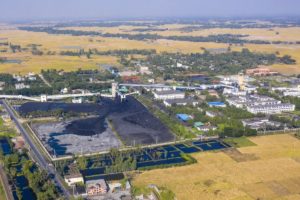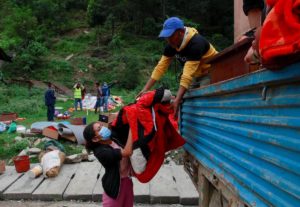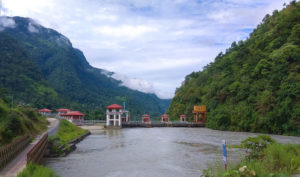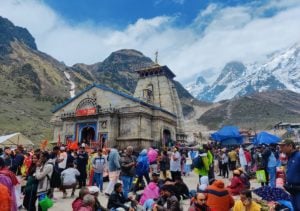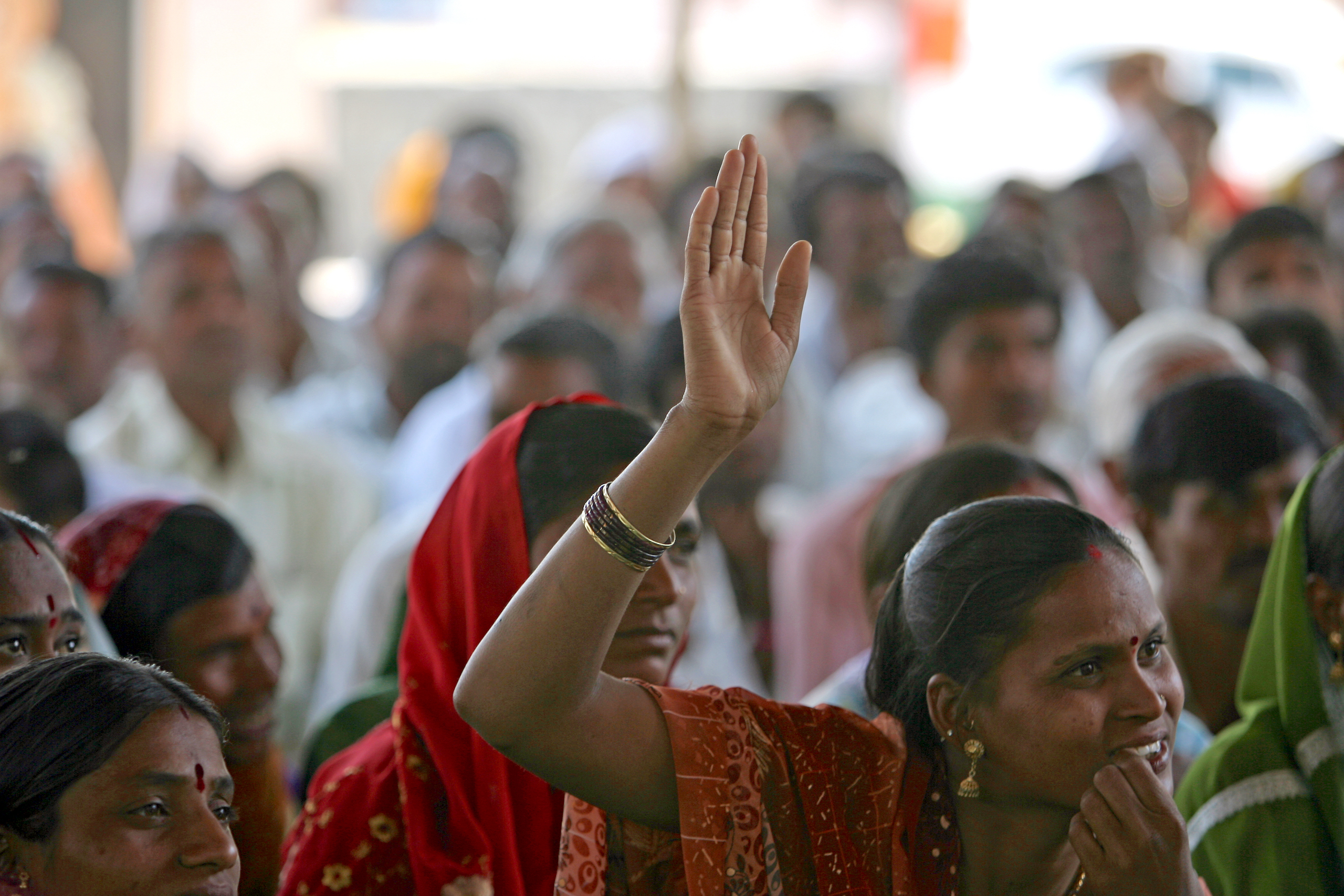
A woman raises her hand to speak at a community meeting in Aurangabad, India, 2009 (Image: Simone D. McCourtie / World Bank, CC BY-NC-ND)
As the world confronts the impacts of climate change, the role of the state is more prominent than ever. The state sets national climate policies and carbon reduction targets, and represents its citizenry at global climate summits. It plays a critical role in sectors, from infrastructure to agriculture, which both drive and suffer the impacts of climate change. Its decisions affect the extent to which entire populations suffer from rising temperatures.
But in many countries, these life-altering decisions are made by a small group of politicians and bureaucrats, as opposed to through consensus building in parliament and the press. This is especially true for South Asia, where countries are increasingly moving towards an opaque decision-making model.
This means that the people most impacted by the effects of climate change have no say over how they are dealt with. As tides get higher due to sea level rise, no one asks local residents if building yet another sea wall is a good idea; if they did, the community would point to other sea walls that have been topped and broken. In the Himalayas, policymakers see building more dams as a solution to uncertainty over water availability, but do not ask residents downstream how that will affect the springs they depend on.
Bangladesh’s black box of decision-making
In Bangladesh, one of the most climate-impacted countries in the world, this trend is readily apparent. The country is currently witnessing a series of demonstrations, as the main opposition party demands that forthcoming elections be held under a caretaker government, as they do not trust the ruling party to follow democratic norms. The ruling party responds that elections worldwide are held under the incumbent government. This impasse, which is threatening the credibility of the country’s electoral process, stems from a system in which ministers and bureaucrats announce decisions that everyone is expected to follow without question.
Even seemingly positive decisions are made in this manner. In 2020, Bangladesh’s then-minister of power, energy and mineral resources raised hopes when he said that the country was “reviewing how we can move from coal-based power plants”. But leaders of think tanks and NGOs often consulted by policymakers in Bangladesh expressed ignorance about the decision before it was announced.
“It’s alright if the minister makes a good announcement without consulting anyone outside the government,” said the head of a Bangladesh-based think tank, who spoke on condition of anonymity. “But if we don’t know the details of the transition plan, we can’t hold the government to account. That’s the problem.”
Opacity in government decision-making often worsens when elections are in the offing, as they now are in Bangladesh. The media in the country is focused almost entirely on electoral prospects, protests and violence. Almost no one is asking politicians about climate goals.
The realities of climate change, water scarcity and pollution remain. But discussion of government plans to tackle these issues are scarce, as are campaign promises from either the ruling and opposition parties on climate.
The little discussion that does occur is perfunctory. In drawing up the Bangladesh Delta Plan 2100, which is intended to make the delta more resilient to the impacts of climate change, the government did seek the input of NGOs and think tanks. But many complained they did not get to see the draft plan before it was finalised. The plan envisages fundamental changes in large parts of the country, but was formulated and is now being implemented without much public discussion.
Nepal’s new constitution
When Nepal brought in a new constitution in 2015, which devolved many powers to local governments, the country showed promise in participatory democratic planning. But since then, most local governments have been just as short-sighted as their federal counterpart in energy and infrastructure planning. Nor have they been any more participatory in their decision making. The only difference is that more decisions are now taken by local rather than federal elites.
Riverbeds are being mined faster than ever before; ill-planned roads and buildings are coming up all over mountain slopes; and dams are still being planned with hardly any public consultation.
Despite green pronouncements, little consultation in Pakistan
Pakistan is the only country in South Asia with a federal ministry dedicated to dealing with the challenges of climate change. After the devastating floods of 2022, the government made a point to tell the world that the disaster was an impact of climate change, and what had happened in Pakistan was not going to stay confined to Pakistan.
The many climate change-induced disasters throughout the world in the first eight months of 2023 have borne out the truth of this assertion. But in Pakistan itself, dealing with climate change is at a standstill due to a prolonged political slugfest that shows no sign of abating.
While public attention is focused on the political crisis, projects are sanctioned behind closed doors and implemented despite protests. The new expressway that threatens Karachi’s largest green space is one example. And when solar power generation plants are built in the Thar desert near coal-fired plants, there is near-zero consultation with local communities – and very little response when civil society members press for information.
Despite green pronouncements from past and present governments, coal-fired power plants continue to play a large role in the China Pakistan Economic Corridor, an area where public consultation has always been zero. Journalists seeking details of CPEC projects have repeatedly been confronted with a wall of silence.
In India, climate injustice takes the blame
India as a country has high carbon emissions, but per capita emissions are low. When India’s ministers speak about emissions in public, they emphasise climate injustice, and point to how rich nations have spent most of the world’s ‘carbon budget’ since the start of the Industrial Age – using this to argue that India should not be forced to decarbonise rapidly.
This is an argument both valid and popular. It has support from politicians, bureaucrats and most think tanks in the country. But it has two adverse effects. One, it leads to a perception that reining in greenhouse gas emissions is a job only for the developed world. Two, it enables policymakers to hide their own shortcomings.
Climate change impacts are coming so fast and hard that they do not permit the luxury of waiting till the next election
In the last few weeks, two Himalayan states – Himachal Pradesh and Uttarakhand – have suffered immense losses to life and property from flooding caused by repeated cloudbursts, a phenomenon scientists have linked to climate change. The same has been seen along the Western Ghats in Maharashtra.
At the same time, India experienced the lowest August rainfall since records began. This will impact agriculture in the coming months, and food prices may skyrocket.
India’s politicians repeatedly blame these problems on climate change caused by rich countries. But this line of argument lets them evade uncomfortable questions, such as why dams were built on steep mountain slopes despite opposition from residents and independent experts; why specific guidelines on how to build roads in mountain areas were ignored; or why building rules are flouted everywhere with impunity.
This all comes back to a lack of participatory democracy in policymaking. India does have rules that mandate public discussion before large infrastructure projects can be approved, but there are plenty of examples to indicate that these rules are routinely flouted.
For far too long, politicians in India have conveniently interpreted democracy as a system in which citizens vote once every five years, while the people voted into power run the country by themselves till the next election. The corollary they propound is that if people do not like what the government is doing, they can vote the government out of power next time. But climate change impacts are coming so fast and hard that they do not permit the luxury of waiting till the next election. They need to be tackled here and now, with the full participation of every section of society.


